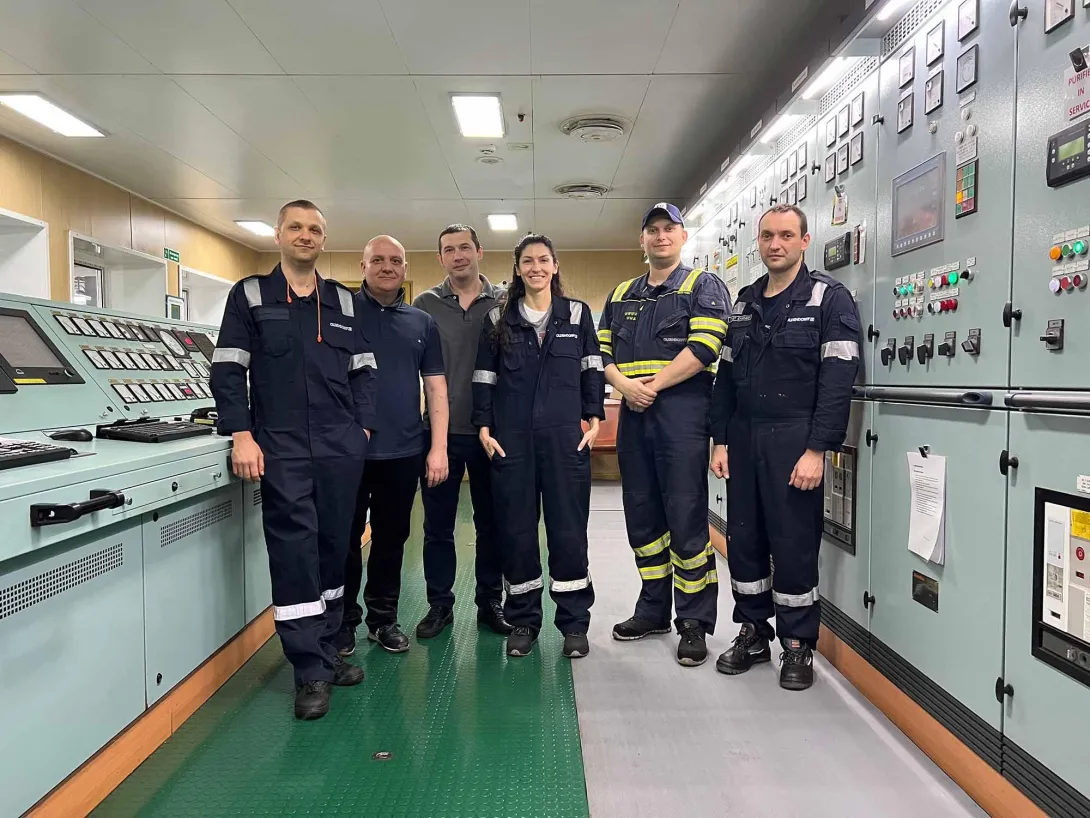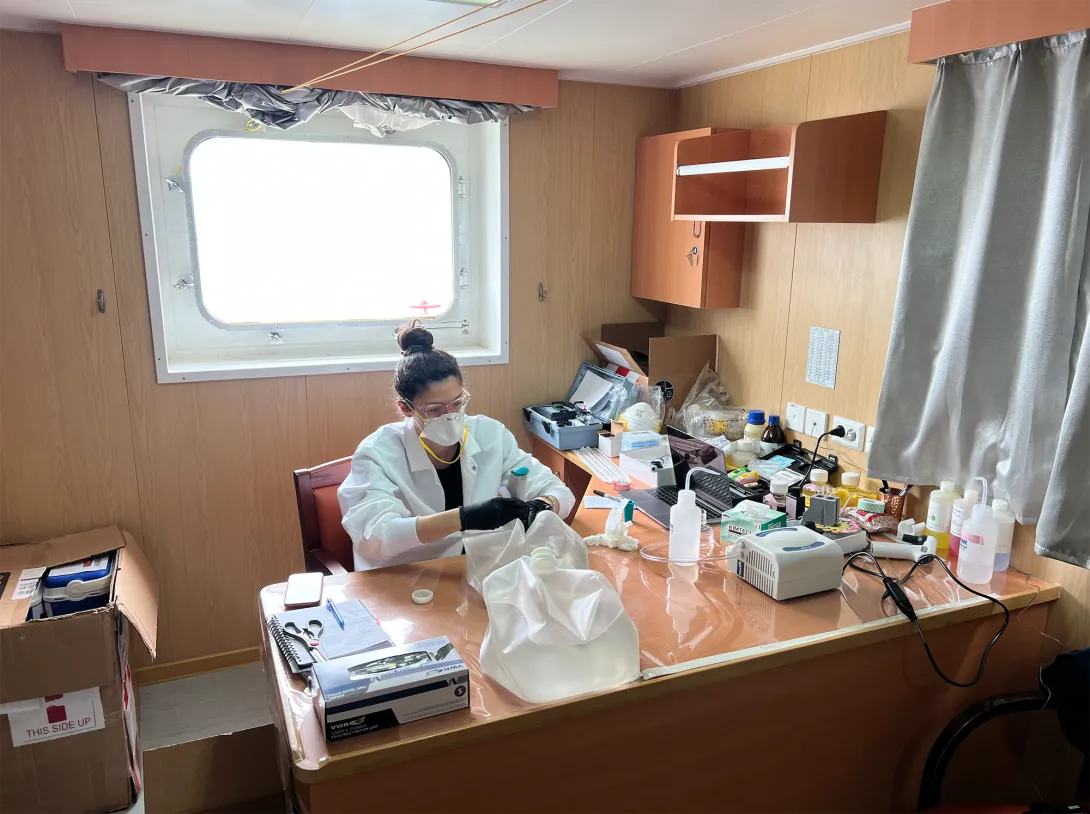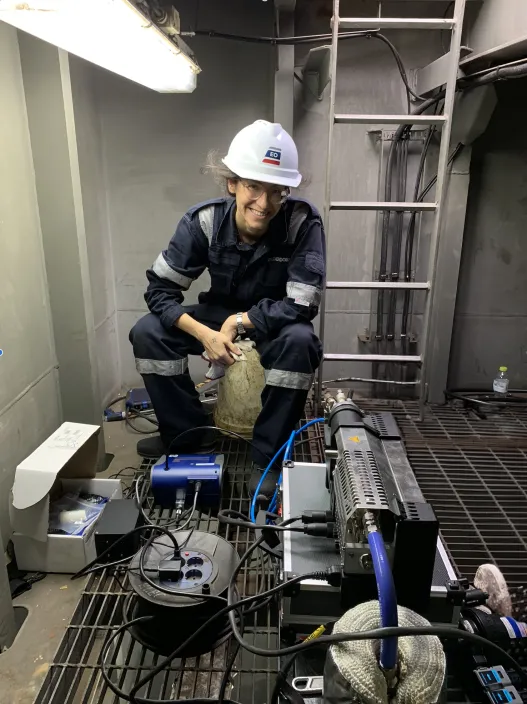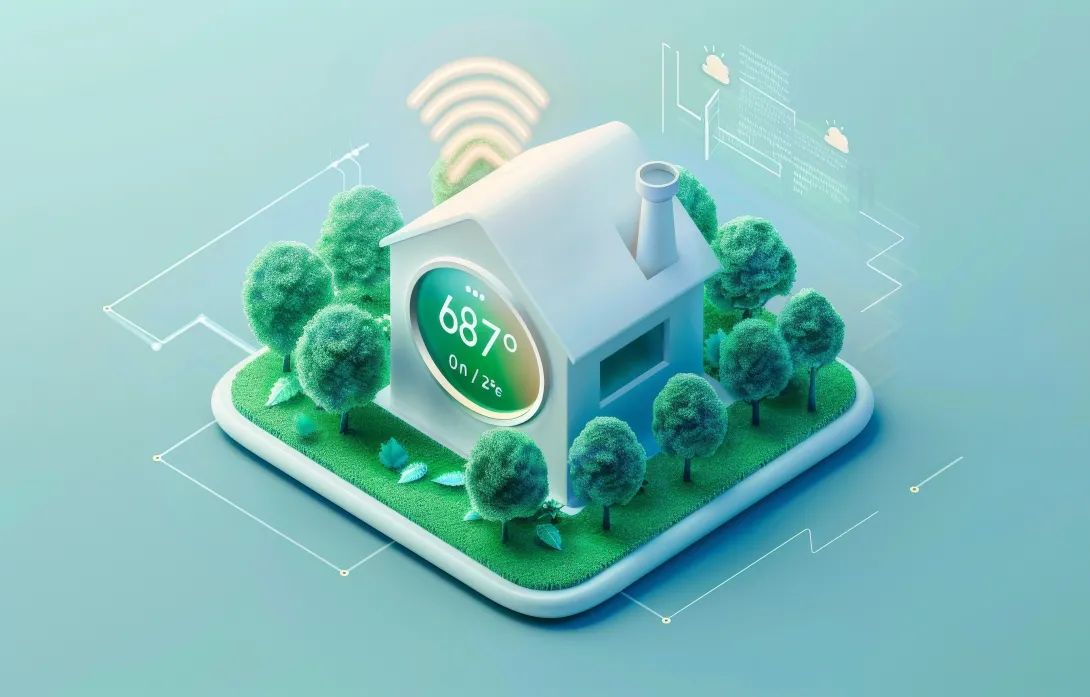Aug. 05, 2024
- Written by Benjamin Wright -
Yuanzhi Tang knows firsthand how much of an impact BBISS can make through its programs. The associate professor in the School of Earth and Atmospheric Sciences answered a BBISS call for faculty fellowships, and later seed funding for a project related to sustainable resources. That project grew into a collaboration with Georgia Tech’s Strategic Energy Institute; the Center for Critical Mineral Solutions (CCMS), supported by the College of Sciences and co-sponsored by BBISS; SEI; the Institute for Electronics and Nanotechnology (IEN); and the Institute for Materials (IMat and IEN are now combined into the Institute for Matter and Systems). The goal of the center is to develop sustainable solutions for the grand challenges associated with critical metals and materials essential for the clean energy transition.
During her time as a faculty fellow within BBISS, Yuanzhi became familiar with the people in the organization and had the opportunity to evaluate student and faculty fellow applications. When the opportunity arose to take on the role of associate co-director of interdisciplinary research for BBISS, she was happy to accept so she could help others access resources that had shaped her growth as a researcher at Georgia Tech.
“Being part of a community of people who value interdisciplinary research on sustainability-related topics, I benefited from the interactions and engagement with BBISS and I hope to carry that forward, particularly for young faculty. They are often eager to connect but might not know where to begin. BBISS can be a starting point for them.”
With a background in geochemistry and degrees from Peking University, Stony Brook University, and a postdoc at Harvard, Yuanzhi has gained a breadth of experience that has earned her a variety of awards and recognition. As she joins BBISS in a formal role, she has some advice for early-career colleagues.
“Go to seminars, events, and organized activities, as the best ideas often come through communicating and networking with others, and that’s how you discover that your expertise is needed in other fields. Be confident in who you are as a scholar, but also go out and find ways to collaborate. Georgia Tech places value on interdisciplinary research, and this is a unique strength that you should leverage.”
Away from the office, classroom, and lab, Yuanzhi is a wife and mother of two young children. She enjoys cuddle time with the kids and navigating parenthood in an academically driven household. Her husband is also a Georgia Tech professor and together they juggle the challenges of their careers with spending quality time with the children. “We try to keep work minimal on weekends and get out of the house and enjoy what Atlanta has to offer. We love nature and appreciate that we can be close to campus, close to the city, and still have so many green places to be outside.”
As she embarks on her new role with BBISS, Yuanzhi sees parallels between being a parent, professor, and now an administrator.
“The world is changing rapidly with the explosion of information and technology. It’s a struggle to know what to teach my kids and my students. How do we prepare them for five, 10, or even 20 years from now? This feeling of responsibility connects my work and personal life. It’s challenging, but also very exciting to see how we can help them embrace changes.”
News Contact
Brent Verrill, Research Communications Program Manager, BBISS
Jul. 30, 2024
Timothy Lieuwen has been appointed interim executive vice president for Research (EVPR) by Georgia Tech President Ángel Cabrera, effective September 10.
Lieuwen is a Regents’ Professor, the David S. Lewis, Jr. Chair in the Daniel Guggenheim School of Aerospace Engineering, and executive director of the Strategic Energy Institute. His research interests range from clean energy and propulsion systems to energy policy, national security, and regional economic development. He works closely with industry and government to address fundamental problems and identify solutions in the development of clean energy systems and alternative fuels.
A proud Georgia Tech alumnus, Lieuwen (M.S. ME 1997, Ph.D. ME 1999) has had a remarkable academic career. He is a member of the National Academy of Engineering and is a fellow of the American Society of Mechanical Engineers, the American Institute of Aeronautics and Astronautics, the American Physical Society, the Combustion Institute, and the Indian National Academy of Engineering (foreign fellow). He has received numerous awards, including the ASME George Westinghouse Gold Medal and the AIAA Pendray Award. He serves on governing or advisory boards of three Department of Energy national labs: Oak Ridge National Laboratory, Pacific Northwest National Laboratory, and the National Renewable Energy Laboratory and was appointed by the U.S. Secretary of Energy to the National Petroleum Council.
Lieuwen has authored or edited four books on combustion and over 400 scientific publications. He also holds nine patents, several of which are licensed to industry, and is founder of an energy analytics company, Turbine Logic, where he acts as chief technology officer.
In Lieuwen’s appointment announcement, President Cabrera said, “Tim’s extensive experience and knowledge of Georgia Tech makes him uniquely suited to lead our research enterprise as we search for a permanent EVPR. I am grateful for his willingness to serve the Institute during this period of remarkable growth, and I look forward to working with him and the rest of the team.”
News Contact
Shelley Wunder-Smith
Director of Research Communications
Jul. 15, 2024
Professor Maryam Saeedifard has been appointed a Ken Byers Professor in the Georgia Tech School of Electrical and Computer Engineering (ECE), effective June 1, 2024.
Saeedifard joined the ECE department as an assistant professor in spring 2014, specializing in power electronics and modular energy conversion systems for both terrestrial and mobile power systems. In terrestrial power systems, her research focuses on the grid integration of large-scale offshore wind and photovoltaic farms through multi-terminal High Voltage DC (HVDC) grids. Her work in this area has been funded by NSF, DOE, ARPA-E, and PSERC. In mobile power systems, she concentrates on stationary and wireless charging of Electric Vehicles (EVs) and Power Processing Units (PPUs) for deep space exploration, with funding from NASA and various companies.
Saeedifard’s contributions have garnered numerous national and international awards, including several prize paper awards for her impactful IEEE Transactions publications. In 2022, she was recognized as an IEEE Fellow by the Power Electronics Society for her significant contributions to multilevel converters and HVDC transmission technology. Additionally, in 2020, she was appointed as a CoE Dean Professor.
She is committed to mentoring, training, and promoting diversity and inclusion among underrepresented graduate students at our school. She has successfully guided and graduated 13 Ph.D. students and 4 M.S. students. Among her Ph.D. graduates, three have secured faculty positions in the U.S., while the others have joined prestigious research labs at companies such as Oak Ridge National Lab, Monolithic Power Systems, Facebook, Nvidia, Tesla, Apple, Ford Motor Co., and Samsung.
In addition to her new appointment, Saeedifard serves as the inaugural Director of Faculty Evaluation and Recognition in the School of ECE and is the Co-Editor-in-Chief of IEEE Transactions on Power Electronics.
News Contact
Dan Watson
Jul. 15, 2024
Time is winding down on Olympic organizers’ plans to stage open-water swimming events in Paris’ iconic Seine River later this month. The city spent $1.5 billion on new infrastructure to clean up the Seine, yet water samples continue to show high levels of potentially toxic E. coli.
The river has been closed to swimmers for the past 100 years because of pollution, but Olympic organizers hope to stage the triathlon and marathon swimming events in the water flowing in the shadow of the Eiffel Tower.
Katherine Graham has followed the saga in Paris. She’s an assistant professor in the Georgia Tech School of Civil and Environmental Engineering who studies the fate and transport of pathogens and their indicators in water, including E. coli. She said several factors are at play in the Seine.
“Paris, like most large cities, has a lot of concrete and not much dirt and grass for water to soak into."
Read the entire story on the College of Engineering website.
News Contact
Jason Maderer
College of Engineering
maderer@gatech.edu
Jun. 12, 2024
When people think of greenhouse gas emissions from transportation, what often comes to mind are airplanes and land vehicles like cars or trucks. But as efforts to slow climate change are ramping up, the spotlight is on another form of transport: ships.
The U.N.’s International Maritime Organization (IMO) has set targets to reduce shipping greenhouse gas emissions by at least 40% by 2030 and 70% by 2040, aiming for net-zero by 2050. Shipping currently accounts for about 3% of global annual greenhouse gas emissions, and the pressure is on shipping companies to meet these ambitious goals.
Across Georgia Tech, researchers are working toward a sustainable future for ocean shipping. This includes Valerie Thomas, the Anderson-Interface Chair of Natural Systems Professor in the H. Milton Stewart School of Industrial and Systems Engineering, and in the School of Public Policy. She is scholar of energy systems, sustainability, assessment, and low-carbon transportation fuels, and her work touches many aspects of the maritime industry.
Read the full story here.
Jun. 07, 2024
Georgia Institute of Technology School of Electrical and Computer Engineering (ECE) Ph.D. candidate Jungyoun Kwak received the Institute of Electrical and Electronics Engineers (IEEE) International Symposium on Circuits and Systems (ISCAS) Pre-doctoral Grant for his groundbreaking research titled, "Monolithic 3D Transposable 3T Embedded DRAM with Back-end-of-line Oxide Channel Transistor," at the 2024 IEEE ISCAS.
The paper introduces an innovative design for a high-density, power-efficient 3T embedded dynamic random-access memory (eDRAM) with the back-end-of-line (BEOL) compatible tungsten-doped indium oxide (IWO) channel transistor. This novel architecture incorporates both near-memory computing (NMC) and in-memory computing (IMC) capabilities within a single array.
The proposed 3T IWO eDRAM offers remarkable advantages, including significantly reducing the area needed for in-memory computing. This is achieved through condensed design and leveraging monolithic 3D integration.
IWO channel transistors also substantially improve data retention compared to traditional solutions due to low sub-threshold leakage, making it an excellent candidate for last-level cache and parallel computing in next-generation computing systems. This will allow for a reduction in energy consumption, while performing data-intensive processes, such as artificial intelligence (AI) computing.
The research is supported by the Center for Heterogeneous Integration of Micro Electronic Systems (CHIMES) and Center for Processing with Intelligent Storage and Memory (PRISM), operating under the Semiconductor Research Corporation (SRC)'s Joint University Microelectronics Program 2.0 (JUMP 2.0), in collaboration with the Defense Advanced Research Projects Agency (DARPA).
The grant is awarded to 10 Ph.D. candidates, facilitating the mobility for them to conduct interdisciplinary research at another research department. The recognition of Kwak’s research also further acknowledges the potential of monolithic 3D integration to extend Moore's Law and address the ever-increasing computational demands of emerging technologies like AI.
Kwak is a member of ECE Professor Shimeng Yu's Laboratory for Emerging Devices and Circuits.
The research group's primary focus is to overcome the limitations of conventional 2D scaling in integrated circuits by vertically stacking circuit components using emerging devices in 3D monolithic integration.
News Contact
Zachary Winiecki
Jun. 03, 2024
Georgia Tech's new GROWER VIP is creating the country's most comprehensive real-time power outage tracker for research use. The database will help researchers explore questions about the causes and effects of power outages and how policy interventions can help strengthen grid resilience.
Why now?
This understanding is urgent in the wake of increasingly extreme climate change-driven weather events and natural disasters, as well as the federal government’s investment of more than $15 billion in grid modernization under the Inflation Reduction Act and Bipartisan Infrastructure Law.
The database will help researchers learn more about the causes of outages and their societal impacts, such as on housing prices, business activity, public health, and crime. It will also help them obtain greater insight into which communities experience the most frequent and longest outages and what can be done to help.
How does it work?
- Utility companies report real-time power outages, but the data is fractured across different service territories and states.
- Users can’t download data directly, making the information difficult to use for research and evaluation.
- Because of this, it's hard for researchers and agencies to understand the extent and scope of problems with the energy grid.
To address these challenges, the GROWER team developed algorithms and web scrapers. They use Amazon Web Services to crawl the utility websites every 15 minutes and collect the power outage data for many states in one place.
Who’s Involved?
The Grid Resilience, Outage, Weather, and Emergency Response (GROWER) Lab is a Vertically Integrated Project launched in 2024 by faculty and students in the Ivan Allen College of Liberal Arts and the College of Engineering.
Brian Y. An, an assistant professor in the School of Public Policy, and Constance Crozier, an assistant professor in the School of Industrial and Systems Engineering, lead the project alongside John Kim, the lab manager and a public policy Ph.D. student. The group includes 15 students in computer science, city and regional planning, business, public policy, and industrial systems and engineering programs.
What’s Next?
The GROWER team has already begun applying findings from the dataset to research questions.
They are writing a paper based on data showing that racial and ethnic minorities experience more frequent and longer power outages than other groups and have also begun examining the effects of power outages on crime and medical emergencies.
This summer, they will partner with the Oak Ridge National Laboratory to provide technical assistance to the Department of Energy Grid Deployment Office, which is the lead federal agency administering grid modernization grants.
“It is incredibly rewarding to connect with research groups in and out of Georgia Tech who share this vision with us,” An said. “We’re excited to conduct robust research that will inform real-word policy making across the country."
News Contact
Di Minardi
Ivan Allen College of Liberal Arts
May. 23, 2024
Matt Cox, a 2014 Ph.D. graduate of the School of Public Policy, played an instrumental role in advancing recent City of Atlanta legislation to help reduce energy burden among low-income residents.
Why tackling energy burden is important: Atlanta is among the nation’s five most energy-burdened cities. If the program performs as advocates expect, it “could be the most impactful climate and energy policy Atlanta has adopted,” says Cox, who as CEO of non-profit Greenlink Analytics uses his Georgia Tech education to find and advocate for equitable climate and energy policies across the Southeast.
“This program will ensure that no resident must choose between food on the table and heating or cooling their homes, making a tangible difference in our community,” City Councilwoman Liliana Bakhtiari said in a statement.
- High energy burden in Atlanta disproportionately affects the city’s Black residents, according to Cox and School of Public Policy from 2018 and 2024.
- Improving energy efficiency is also a smart way to address climate change, School of Public Policy researchers say.
- Cox worked with former Clean Energy Advisory Board Chairwoman Wykeisha Howe to win backing for the energy burden measure. "We discussed the matter with every council member, emphasizing the necessity of creating a fund to finance essential home improvements that would relieve unnecessarily high bills." he said. "We explained the constraints of federal funding, which often resulted in only partial assistance for many households."
- Due in part to Cox’s work, almost every City Council member supported the bill.
Of note: Cox, who helped develop the energy analytics platform used by Greenlink while a Ph.D. student at Georgia Tech, worked on a similar program for Athens, Georgia.
Key context: Helping reduce climate change impacts is a key goal of the School. For instance, Regents’ Professor Marilyn A. Brown recently helped Georgia create its first-ever climate action plan. Professor Daniel Matisoff recently won an award for his work on the benefits of green building pilot programs. And educating a new generation of sustainable energy leaders is the mission of the School’s innovative Master of Sustainable Energy and Environmental Management degree.
News Contact
Michael Pearson
Ivan Allen College of Liberal Arts
May. 14, 2024
In a study by a Georgia Tech economist that could help inform future energy policy, half the participants cranked their thermostats despite knowing exactly how much each extra degree would cost them.
Prices are typically the first tool used to get people to save energy, noted Dylan Brewer, assistant professor in the Georgia Tech School of Economics. As climate change affects communities and utilities transition to sustainable sources, it’s increasingly critical for regulators and utilities to understand exactly how price affects consumers’ energy use.
“There's kind of a puzzle that exists in the literature on energy consumption,” Brewer said. When it comes to most commodities, price drives demand, but “if the price of electricity changes, most people are not very responsive.” He wanted to test the popular theory that inelastic demand is the result of consumers not knowing the exact price of turning up the thermostat.
In his 2023 study in the journal Energy Policy, Brewer surveyed a sample of Americans after a winter of real-time heating decisions. They were presented with different cost scenarios and asked about their “bliss point” — the temperature at which they’d keep their houses if money were no object.
As a Ph.D. student at Michigan State University, Brewer was struck by how many landlords offered “free heat” during East Lansing’s frigid winters.
He saw that when “people are not on the hook for a decision, they're often wasteful. But if they're paying for their environmental costs, they're going to conserve.” He focused on this phenomenon in his dissertation and has since launched other projects on the economics of thermostat settings. “It’s my niche,” he said.
In the study, participants knew exactly how much an extra degree of heat would cost them. Yet even at the highest price level ($8 per 5 degrees Fahrenheit), half of them exhibited zero response to price, Brewer reported. On average, doubling heating costs led respondents to say they would lower less than 1 degree Fahrenheit.
Brewer found that participants with incomes below $50,000 and those living in urban areas were more responsive to price changes, while older participants had less elastic demand.
It turns out, Brewer noted, “People simply do not like to be cold.”
The results are just as relevant for warm-weather states. In Georgia in 2022, 42% of the state's electricity was used for air conditioning and nearly three in five households with electric heating, according to the U.S. Energy Information Association.
Based on study results, Brewer noted that utilities confronted with extreme weather or a supply-side disruption might encourage customers to shift electricity usage to off-peak hours rather than assume they’ll be affected by an increase in rates. “If you have an energy emergency and need to curb energy consumption, this is telling you that prices are not going to do it,” he said.
“This is a daily choice that we make,” Brewer said. “Given that we spend a huge fraction of our time in climate-controlled buildings, these types of heating and cooling issues have pretty large implications.”
Written by: Deborah Halber
May. 13, 2024
People using energy-efficient smart thermostats are willing to sacrifice comfort and control to save relatively small amounts of energy that could add up if enough people sign on, a Georgia Tech economist reported in a recent study.
With federal and state energy policies targeting aggressive decarbonization in the next 15 years, smart technologies have the potential to help achieve these goals at a reasonable cost, said Casey J. Wichman, associate professor in the Georgia Institute of Technology School of Economics.
In a forthcoming issue of American Economic Journal: Applied Economics, Wichman and colleagues report that automation within smart thermostats can lead to potentially large reductions in household electricity use and costs.
Utilities look to time-of-use (TOU) pricing — where prices are higher during peak demand and lower during lags in demand — to save consumers money and relieve pressure on the grid.
“From an economics perspective, there's this idea that if you set the price right, everything will work out,” Wichman said. “But if consumers don't actually respond to those prices, that limits the effectiveness of the solution.”
For the study, more than 2,100 Toronto-area residents using Ecobee smart thermostats agreed to share their usage data during the 2019 rollout of a suite of new thermostat features that included an automated component.
Participants opted to allow the thermostats to precool or preheat their homes at times of the day when electricity was less expensive, choosing on a sliding scale how aggressive they wanted the algorithm to be. Degree changes within the homes varied from around 1 to 5 degrees, saving participants up to 30 Canadian cents per day in the summer.
“I have always liked applying economic concepts to simple decisions we make in our daily lives,” Wichman said. “This allows me to answer new questions about how decisions matter for the environment, and how policies or technologies can be designed to generate social change. In this project, we’re leveraging new data sources to try to capture the unaccounted-for costs of those policies.”
Studies on energy savings, he said, often miss the in-home comfort cost. These results showed that people seemed willing to trade relatively small monetary savings for a small increase in discomfort, although discomfort was most pronounced for residents who typically spend more time at home. For the most part, people were willing to sacrifice control over their heating and cooling decisions to an algorithm.
This finding surprised Wichman. “We thought we would see more people turn off the feature,” he said. That didn't happen.
As time-varying electricity pricing rolls out across North America, utilities could provide incentives for customers to opt into energy-saving settings programmed into internet-connected home appliances, like water heaters, pool pumps, and electric vehicles.
The researchers’ results suggest that such programs could be designed in a way that customers will accept. This gives Wichman a sense of optimism for the future.
“What is interesting here is that technology can complement economic incentives,” he said. “You can have technology correct for humans’ inability to remember to set their heating and cooling schedule in a way that's consistent with social goals.”
Author: Deborah Halber
Pagination
- Previous page
- 10 Page 10
- Next page












